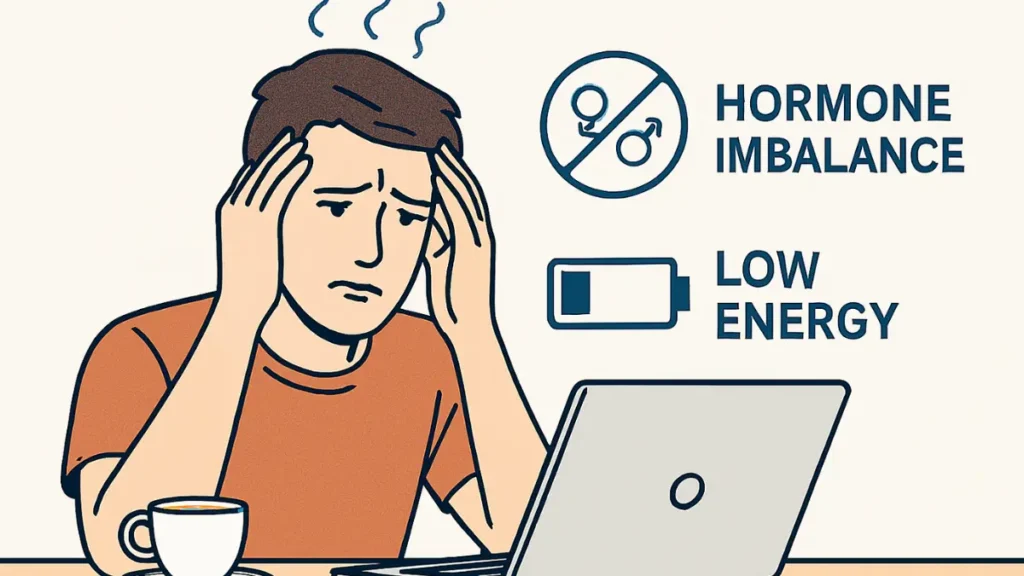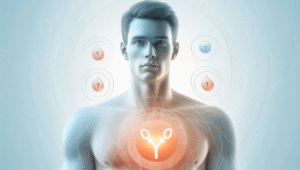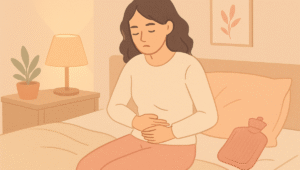What causes low testosterone in young males? It’s a question many don’t expect to face early in life, but it’s becoming more common. Low testosterone levels are not just an “older men’s issue” anymore. Young males today are experiencing symptoms like fatigue, low energy, mood swings, and even reduced muscle strength because of several lifestyle, medical, and environmental factors. In this guide, we’ll break down the exact causes, symptoms, and ways to tackle them in simple, easy-to-understand language.
So, what causes low testosterone in young males, and why is this problem on the rise? In this guide, we’ll break it down in simple, clear language. We’ll explore every possible cause – from daily habits to medical conditions – and share practical tips to help you understand and improve hormone health.
What Causes Low Testosterone in Young Males – An Overview
Testosterone is much more than a “male hormone.” It influences everything from physical strength to mental sharpness and emotional well-being. It’s key for muscle growth, energy, reproductive health, and even confidence.
Key points:
- Supports brain function, metabolism, and bone strength.
- Low testosterone can bring depression, irritability, weight gain, and even low self-esteem.
Ignoring low testosterone doesn’t just affect the present; it can also lead to long-term issues like fertility problems and weaker bones. Awareness and timely action are crucial.
Lifestyle Habits That Cause Low Testosterone in Young Males
Modern lifestyles are fast-paced and often unhealthy, which is one of the main reasons behind what causes low testosterone in young males.
Poor Diet Choices – The Silent Hormone Killer
- Processed foods and sugar: High intake of sugary drinks, fried foods, and processed snacks can cause obesity and insulin resistance, which harm hormone balance.
- Nutrient deficiencies: Low zinc, vitamin D, and magnesium – common deficiencies – directly reduce testosterone production.
Lack of Exercise and Too Much Sitting
- A sedentary lifestyle weakens muscles and lowers testosterone.
- Strength training, resistance workouts, and even regular walks can improve levels naturally.
Stress and Sleep – The Hidden Enemies
- Stress overload: Exams, work pressure, or personal stress increase cortisol – the stress hormone that reduces testosterone.
- Sleep deprivation: Testosterone is produced mostly during deep sleep. Sleeping less than 6 hours affects production significantly.
Key takeaway: Balanced meals, active living, and at least 7–9 hours of rest are simple but powerful ways to protect your hormone health.
Also Read: Mental Health Retreat for Depression: Heal and Transform
Medical Conditions Linked to Low Testosterone in Young Men
Sometimes lifestyle isn’t to blame. There are medical or biological reasons for what causes low testosterone in young males.
Hormonal Disorders
- Hypogonadism: When the testicles don’t produce enough testosterone, either due to an internal problem (primary) or brain-pituitary issue (secondary).
- Thyroid or pituitary problems: These glands control hormone signals, and any imbalance can reduce testosterone.
Chronic Conditions and Injuries
- Diabetes, obesity, liver disease, or even infections can reduce hormone production.
- Past injuries or surgeries on the testicles may permanently affect levels.
Genetic Conditions
- Klinefelter syndrome and other rare genetic disorders can lower testosterone naturally.
If symptoms persist, blood tests and hormone panels can confirm levels and guide treatment.
Stress and Mental Health – A Hidden Cause of Low Testosterone
Not all causes are obvious. The environment you live in plays a bigger role than you think.
Chemicals in Daily Life
- Plastics and BPA: Found in bottles and containers, they mimic hormones and can disrupt production.
- Pesticides and cosmetics: Many products contain endocrine disruptors that affect natural hormone signals.
Pollution and Toxins
- Air pollution, contaminated water, and heavy metals can accumulate in the body, affecting reproductive organs and hormone function.
Practical tips:
- Use stainless steel or glass bottles instead of plastic.
- Wash fruits and vegetables thoroughly.
- Choose chemical-free grooming and cleaning products.
Also Read: Does Masturbation Cause Low Testosterone? Shocking Truth!
How Diet and Sleep Affect Testosterone in Young Males
Hormones and mental health are closely linked. Stress, anxiety, and emotional struggles can directly impact testosterone.
Stress and Cortisol
- High cortisol, the stress hormone, competes with testosterone and reduces production.
Depression and Social Pressure
- Feelings of isolation, low self-worth, or social stigma about discussing health issues often keep young men from seeking help.
Solution: Focus on emotional health. Activities like meditation, therapy, and open conversations can lower stress and improve hormone balance.
Can Low Testosterone Be Reversed in Young Males?
The good news? Many causes are reversible. Here’s how you can take control:
Lifestyle Changes That Work
- Exercise at least 4–5 times weekly; strength training is most effective.
- Sleep deeply for 7–9 hours to allow natural hormone repair.
- Eat hormone-supporting foods: eggs, lean meat, fish, nuts, seeds, and whole grains.
- Get sunlight exposure for vitamin D or take supplements if needed.
- Reduce alcohol and avoid smoking.
Seek Professional Help When Needed
If lifestyle changes don’t improve symptoms, consult an endocrinologist. Early testing and treatment can prevent long-term complications.
Key takeaway: Consistency is the key. Small daily changes add up to long-term hormone health
Also Read: How Much Testosterone Should a Woman Inject Per Week
Also Read: What Does Testosterone Do for Women? Unlock the Benefits
FAQs
Should young men take testosterone supplements?
Only under medical supervision. Unnecessary supplements can harm natural production.
Is low testosterone common in athletes?
Yes, especially in those who overtrain without proper recovery.
What are common signs of low testosterone?
Low energy, weight gain, mood swings, poor focus, and reduced sex drive.









